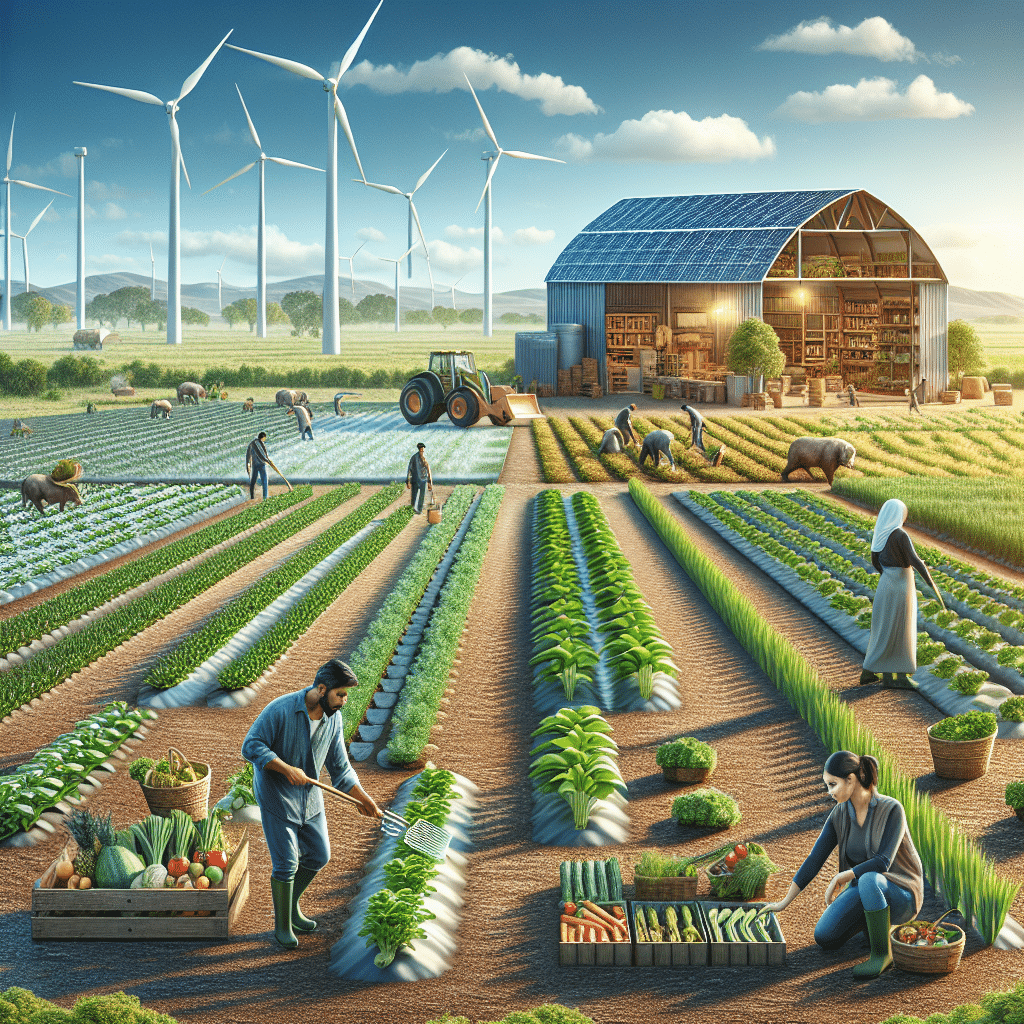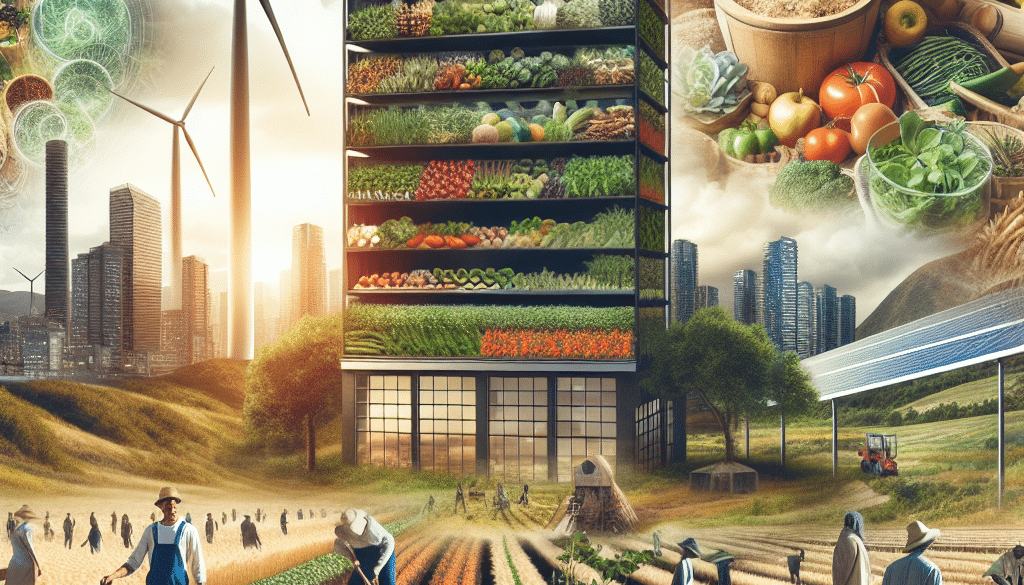Sustainable Food Supply: Building a Greener Future
-
Table of Contents
- Sustainable Food Supply: Charting the Path to a Greener Future
- The Pillars of Sustainable Food Systems
- Advancements in Agricultural Practices
- Reducing Food Waste
- Embracing Plant-Based Diets
- Local and Urban Farming Initiatives
- Policy and Global Cooperation
- Conclusion: A Unified Approach to a Greener Future
- ETprotein: A Sustainable Choice for Protein Needs
Sustainable Food Supply: Charting the Path to a Greener Future

The global population is projected to reach nearly 10 billion by 2050, and with this surge comes an unprecedented demand for food. The challenge of feeding this growing population in a sustainable manner, without further harming the planet, is one of the most pressing issues of our time. A sustainable food supply is not just about producing more food; it’s about creating systems that are resilient, environmentally friendly, and socially responsible. In this article, we will explore the various facets of building a sustainable food supply and how it can lead to a greener future.
The Pillars of Sustainable Food Systems
Sustainable food systems are built on three main pillars: environmental health, economic viability, and social equity. These pillars are interdependent, and a balance must be struck between them to achieve true sustainability.
- Environmental Health: This involves practices that maintain soil fertility, conserve water, reduce greenhouse gas emissions, and preserve biodiversity.
- Economic Viability: For a food system to be sustainable, it must be economically feasible for all stakeholders, including farmers, distributors, and consumers.
- Social Equity: A sustainable food system ensures fair labor practices, supports rural communities, and provides access to nutritious food for all populations.
Advancements in Agricultural Practices
One of the key areas of focus in building a sustainable food supply is the adoption of advanced agricultural practices that are both productive and environmentally sound.
- Regenerative Agriculture: This approach goes beyond sustainable farming by actively improving the ecosystem. Practices such as crop rotation, cover cropping, and reduced tillage help to rebuild soil organic matter and restore degraded soil biodiversity.
- Precision Agriculture: Leveraging technology like GPS, drones, and IoT devices, precision agriculture enables farmers to optimize inputs such as water and fertilizer, thus reducing waste and environmental impact.
- Organic Farming: By avoiding synthetic pesticides and fertilizers, organic farming can reduce pollution and create healthier soils.
Reducing Food Waste
Food waste is a significant issue that undermines the sustainability of our food systems. Approximately one-third of all food produced globally is wasted. Addressing this problem is crucial for building a sustainable food supply.
- Improved Storage and Transportation: Innovations in packaging, refrigeration, and logistics can reduce spoilage during the journey from farm to table.
- Consumer Education: Teaching consumers about proper food storage and creative ways to use leftovers can significantly cut down on household food waste.
- Food Recovery Programs: These programs redirect surplus food from retailers and restaurants to those in need, reducing waste and addressing food insecurity simultaneously.
Embracing Plant-Based Diets
The production of animal-based foods is resource-intensive and a major contributor to greenhouse gas emissions. A shift towards plant-based diets can alleviate pressure on the environment.
- Health Benefits: Plant-based diets are associated with lower risks of chronic diseases such as heart disease, diabetes, and certain cancers.
- Environmental Impact: Compared to meat production, plant-based foods generally require less water, land, and energy, and they produce fewer emissions.
- Economic Incentives: Governments and organizations can promote plant-based diets through subsidies, education campaigns, and support for plant-based food businesses.
Local and Urban Farming Initiatives
Bringing food production closer to consumers can reduce the carbon footprint associated with transportation and provide fresher, more nutritious options.
- Community Gardens: These spaces not only provide local produce but also foster community engagement and education about sustainable practices.
- Urban Agriculture: Techniques like vertical farming and hydroponics allow for high-yield production in small urban spaces, using less water and no pesticides.
- Supporting Local Farmers: Farmers’ markets and farm-to-table restaurants can create economic opportunities for local farmers while offering consumers access to fresh, seasonal foods.
Policy and Global Cooperation
Creating a sustainable food supply is not solely the responsibility of individuals or businesses; it requires coordinated efforts from governments and international bodies.
- Subsidies and Incentives: Policies that support sustainable farming practices and renewable energy can encourage widespread adoption.
- International Standards: Global agreements on sustainable food production and trade can level the playing field and prevent a race to the bottom in environmental standards.
- Research and Development: Investing in agricultural research can lead to breakthroughs in sustainable practices and crop varieties that are resilient to climate change.
Conclusion: A Unified Approach to a Greener Future
In conclusion, building a sustainable food supply is a multifaceted endeavor that requires the commitment of all sectors of society. From the adoption of advanced agricultural practices to the reduction of food waste, embracing plant-based diets, supporting local farming, and implementing supportive policies, each action contributes to a greener and more equitable future. By working together, we can ensure that our food systems are not only capable of feeding the growing global population but also of preserving the planet for future generations.
ETprotein: A Sustainable Choice for Protein Needs
In line with the pursuit of a sustainable food supply, ETprotein offers a range of organic bulk vegan proteins that are environmentally friendly and socially responsible. Their products, including Organic rice protein, pea protein, and various seed proteins, are non-GMO, allergen-free, and characterized by a neutral taste. ETprotein’s commitment to quality and sustainability makes them an excellent choice for those looking to incorporate sustainable protein sources into their diets or product offerings.
About ETprotein:
ETprotein, a reputable protein and L-(+)-Ergothioneine (EGT) Chinese factory manufacturer and supplier, is renowned for producing, stocking, exporting, and delivering the highest quality organic bulk vegan proteins and L-(+)-Ergothioneine. They include Organic rice protein, clear rice protein, pea protein, clear pea protein, watermelon seed protein, pumpkin seed protein, sunflower seed protein, mung bean protein, peanut protein, and L-(+)-Ergothioneine EGT Pharmaceutical grade, L-(+)-Ergothioneine EGT food grade, L-(+)-Ergothioneine EGT cosmetic grade, L-(+)-Ergothioneine EGT reference grade and L-(+)-Ergothioneine EGT standard. Their offerings, characterized by a neutral taste, non-GMO, allergen-free attributes, with L-(+)-Ergothioneine purity over 98%, 99%, cater to a diverse range of industries. They serve nutraceutical, pharmaceutical, cosmeceutical, veterinary, as well as food and beverage finished product distributors, traders, and manufacturers across Europe, USA, Canada, Australia, Thailand, Japan, Korea, Brazil, and Chile, among others.
ETprotein specialization includes exporting and delivering tailor-made protein powder and finished nutritional supplements. Their extensive product range covers sectors like Food and Beverage, Sports Nutrition, Weight Management, Dietary Supplements, Health and Wellness Products, and Infant Formula, ensuring comprehensive solutions to meet all your protein needs.
As a trusted company by leading global food and beverage brands and Fortune 500 companies, ETprotein reinforces China’s reputation in the global arena. For more information or to sample their products, please contact them and email sales(at)ETprotein.com today.












